- About us
- Support the Gallery
- Venue hire
- Publications
- Research library
- Organisation chart
- Employment
- Contact us
- Make a booking
- Onsite programs
- Online programs
- School visit information
- Learning resources
- Little Darlings
- Professional learning
Lillie Langtry (1853-1929) was born Emilie Charlotte Le Breton in Jersey in 1853. Aged nineteen she married the son of a Belfast shipowner with whom she moved to London. There, she rose to prominence as a professional beauty and style-setter whose acquaintances included various members of the social and cultural elite. She thus came within the orbit of Albert Edward, Prince of Wales (known as Bertie to his family), Queen Victoria's eldest son and heir to the throne, whose dalliance with the Irish actress Nellie Clifden in 1861 had already created scandal. His liaison with Langtry commenced in 1877 and lasted three years. It was an open secret, generating notoriety and cachet for Langtry in equal measure. Around 1880 she began a relationship with Prince Louis of Battenberg (Louis Mountbatten), with whom she had a daughter. This precipitated the deterioration of her marriage which ended in 1881. Being without a conventional means of support she decided to earn a living as an actress and made her professional stage debut in London in December 1881. Capitalising on her beauty and reputation, she then formed her own theatre company with which she toured to the United States several times between 1882 and 1889. That year, having established independent wealth through investments in racehorses and real estate, she returned permanently to England. In 1899 she married the heir to an English baronetcy who was eighteen years her junior. She retired to Monaco after World War One and published her memoir The days I knew in 1925.
Brothers William Downey (1829-1915) and Daniel Downey opened their first photographic studio in 1863 in Newcastle-on-Tyne. In 1872 the business expanded to London, William running the new studio in Belgravia while Daniel maintained the business in Newcastle. The firm became known for carte de visite and cabinet card portraits of celebrities and the aristocracy and is said to have been particularly favoured by Queen Victoria, whom they photographed on many occasions from the late 1860s until the 1890s. The Prince of Wales, later King Edward VII, was also a significant patron. W & D Downey's 1868 carte-de-visite of his wife the Princess of Wales (later Queen Alexandra) piggy-backing her baby daughter Princess Louise was extraordinarily popular, selling some 300,000 copies. William's son William Edward Downey (1855-1908) also became a photographer.
Collection: National Portrait Gallery
Gift of Malcolm Robertson in memory of William Thomas Robertson 2018. Donated through the Australian Government's Cultural Gifts Program.
This carte-du-visite portrait of Lillie Langtry by W and D Downey is 10.3 cm long by 6.2 cm wide and was created in 1885. A late 19th Century, sepia toned photograph, the image is a profile of the left side of her face as she turns towards her right. Lillie’s head and chest occupies most of the space inside the paper frame. Light from the right illuminates her oval shaped face and chest, and brings the silhouette profile of her face into white relief against the mid-tone background. Red brown text beneath the image reads: W.& D. Downey 57 & 61 Ebury St London S.W. Copyright.
Lillie’s forehead is covered in gentle curls, styled to frame her face, and then swept back into a chignon. Her left, almond shaped eye gazes upward, framed with a soft shadow that disappears along the ridge of her elegant nose and cheekbone. Her even, shapely lips are closed. A soft shadow extends around her cheek towards her small ear and down her neck. Her complexion appears flawless, interrupted only by a speckling of tiny, light and irregular spots that reveal the photograph’s vintage.
A fine pearl choker with a centrally hanging circular stone and jewel pendant, adorns her neck. The lustre of the pearls makes them appear to softly shimmer against the white of Lillie’s neck and upper chest and the shadow on the left beneath her ear. Her shoulders are fringed in luxurious fabric. The suggestion of a cleavage and edges of her shoulders are cropped by the discoloured, once white frame.
Audio description written by Meredith Hughes and voiced by Annette Twyman, 2021
Malcolm Robertson (16 portraits)



On one level The Companion talks about the most famous and frontline Australians, but on another it tells us about ourselves.

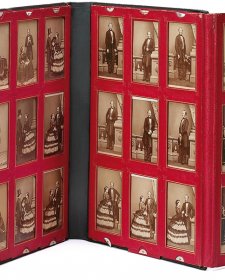
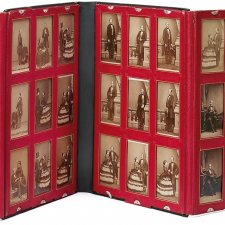
Joanna Gilmour discusses the role of the carte de visite in portraiture’s democratisation, and its harnessing by Victoria, the world’s first media monarch.
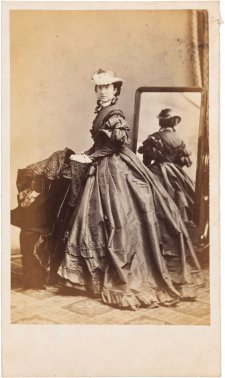
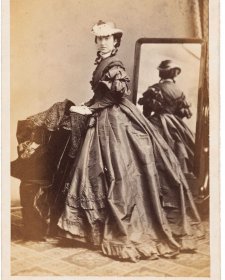
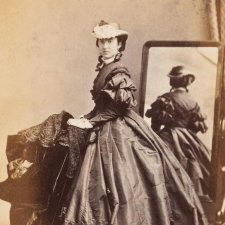
Drawn from the NPG’s burgeoning collection of cartes de visite, Carte-o-mania! celebrates the wit, style and substance of the pocket-sized portraits that were taken and collected like crazy in post-goldrush Australia.